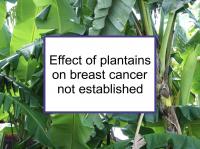Plantains (Musa paradisiaca), which are closely related to bananas, are a very good source of beta-carotene and include some alpha-carotene. Plantains are also a good source of potassium and vitamin B6 and contain some dietary fiber and vitamin C. Deep frying does not significantly reduce the carotenoid content of plantains.
Breast cancer-related effects of eating plantains
At approximately 55 to 66, ripe sweet plantains do not have a high glycemic index. However, deep frying in vegetable oil can increase this to approximately 85 to 95, a high level. Diets dominated by high glycemic index foods have a high glycemic load, which appears to increase the risk of breast cancer (see our article on glycemic load). Cooked plantains have a somewhat higher micronutrient content than bananas and probably have correspondingly higher anti-cancer properties.
Plantain extracts have been reported to reduce proliferation and angiogenesis of hormone receptor positive (ER+/PR+) and triple negative (ER-/PR-/HER2-) breast cancer cells. However, data that specifically addresses the association between plantain consumption and breast cancer is not available.
Plantains contain some ferulic acid, kaempferol, myricetin, and quercetin, all of which have been reported to have anti-cancer properties. However, the most prominent anti-cancer micronutrient in plantains is beta-carotene.
Beta-carotene and breast cancer
Plantains with orange flesh have a higher carotenoid content than lighter colored plantains. Women with substantial intake of carotenoids such as beta-carotene have been reported to have lower risks of breast cancer and its recurrence than those with low intake, although not all studies are in agreement.
A Scandinavian study found that dietary (but not supplemental) beta-carotene had a protective effect against lobular breast cancer in postmenopausal women. Another European study reported that high intake of beta-carotene was protective against breast cancer in postmenopausal women using hormone replacement therapy (HRT). The same study also found that dietary beta-carotene was associated with lowered risk of breast cancer in postmenopausal women with relatively high alcohol consumption.
Beta-carotene enhanced the cytotoxicity of doxorubicin in both hormone receptor positive (ER+/PR+) and triple negative (ER-/PR-/HER2-) breast cancer cells in one study. Beta-carotene has been demonstrated to reduce multidrug resistance in cancer cells. In addition, treatment with beta-carotene has been shown to reduce cardiotoxicity induced by the chemotherapy drug cisplatin in rats.
Additional comments
Whether underripe and green or overripe and sweet, plantains must be cooked by steaming, baking, boiling or frying before being eaten. Plantains should be washed before peeling or cooking whole since pesticides are often applied liberally in growing them.
The leaves and other parts of the plants Plantago lanceolata and Plantago major are found in some herbal remedies and may be listed as "plantain." These plants are similar to each other, but quite different from the banana-like plantain. In the past, some herbal preparations labeled as containing plantain have been found to be contaminated with the heart medicine digitalis. In one study, the plant contained in one preparation was identified as Digitalis lanata instead of "plantain leaves." It is not clear whether such contamination continues to be a problem. Psyllium laxatives are derived from other plantago cultivars, Plantago psyllium or Plantago ovata.
Sources of information provided in this webpage
The information above, which is updated continually as new research becomes available, has been developed based solely on the results of academic studies. Clicking on any of the underlined terms will take you to its tag or webpage, which contain more extensive information.
Note that while we are searching continually for new evidence concerning plantains, there is not much interest in it among breast cancer researchers, so few studies that focus on plantains are available.
